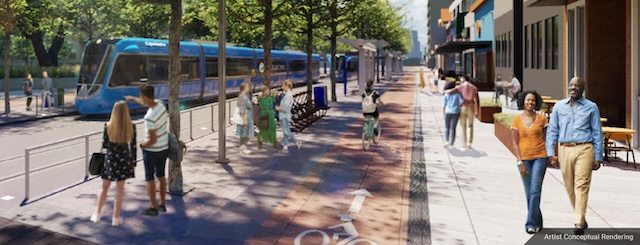Texas Attorney General Ken Paxton is asking a state court to cancel Austin’s light-rail plans. Capital Metro, Austin’s transit agency, persuaded voters to raise taxes to build light rail in 2020. Soon after the vote, however, the agency admitted that rail would cost a lot more than it had claimed and so less would be built than promised. Paxton says that in doing so it has breached its contract with the voters and its plans should be rejected.
Imagining light rail in Austin. Smiling happy people, no cars, and no crime make this scene a complete fantasy. Source: Project Connect.
Paxton has gotten in trouble over securities fraud and has taken positions on abortion and immigration that I disagree with. I am sure there are rail transit advocates who are gnashing their teeth over the idea that a lawsuit could overturn the “will of the people” to build light rail in Austin. But, while I am obviously biased, I think that defining the election as a “contract” and ruling it invalid if Capital Metro can’t keep its part of the contract is a great idea.
As Antiplanner readers know, almost every rail transit plan built in the U.S. in the last 40 years has gone way over budget. Many were built only after voters agreed to raise taxes to fund those projects, and due to the cost overruns either less was built than originally planned or the agencies paid for the projects by collecting taxes for more years than was promised. Taxpayers would have saved billions, and transit agencies would be more responsible in their initial cost estimates, if all projects that went over budget were simply halted.
As I noted earlier this week, underestimating costs biases an analysis in favor of technologies with the highest capital costs. Once Capital Metro realized that costs were more than 75 percent higher than projected, it should have discarded light rail in favor of express buses or bus rapid transit. But light rail didn’t make sense in the first place; cities like Honolulu and Seattle have shown that transit agencies want to build it anyway no matter what the cost.
Both voters and decision makers appear to be almost completely innumerate. Buses can move people faster than rail at a far lower cost? Build rail anyway; it’s only a few billion dollars! Transit-oriented developments cost two to four times as much as single-family homes? Build them anyway; they’re affordable housing! Is this because people don’t understand numbers or because they don’t want to understand numbers? Either way, a lawsuit that defines elections as contracts sounds like a good solution.









Rail schemes in 21st century go thru a myriad of problems. I’ve said before largely the main user base has been alienated away from the system or Automotive systems have usurped it’s customer base. But their main strategies to thwart cancelation.
1) spend and initiate so much money its impossible to stop once commenced.
2) invest in key specific technologies that if it fails are impossible to redesign.
We see this kind of asinine behavior in another industry famous for boondoggles… War.
I don’t use word “defense” because we haven’t fought a war in the name of our defense since World War II.
Fitzgerald’s First Law of defense acquisition:
“There are only two phases of a program. The first is ‘It’s too early to tell.’ The second: ‘It’s too late to stop.’”
Ernest Fitzgerald, best known; appeared on a morning network-television talk show waving a yellowed plastic airplane toilet pan, expounding on what he said was an exorbitant $642 originally charged to the Air Force.
Fitzgerald’s reputation goes back to 1968 when he told a congressional hearing that the C5 Galaxy; military transport plane would cost $2 billion more than the Defense Department’s original contract. As a result, the Pentagon fired him, and he began a 13-year court battle to get his job back., Upon rehiring, he helped initialize cost savings for C5B upgrades which saved 273 million dollars.
” Smiling happy people, no cars, and no crime make this scene a complete fantasy.”
It’s interesting how when you design cities around making car driving the priority, crime goes away!